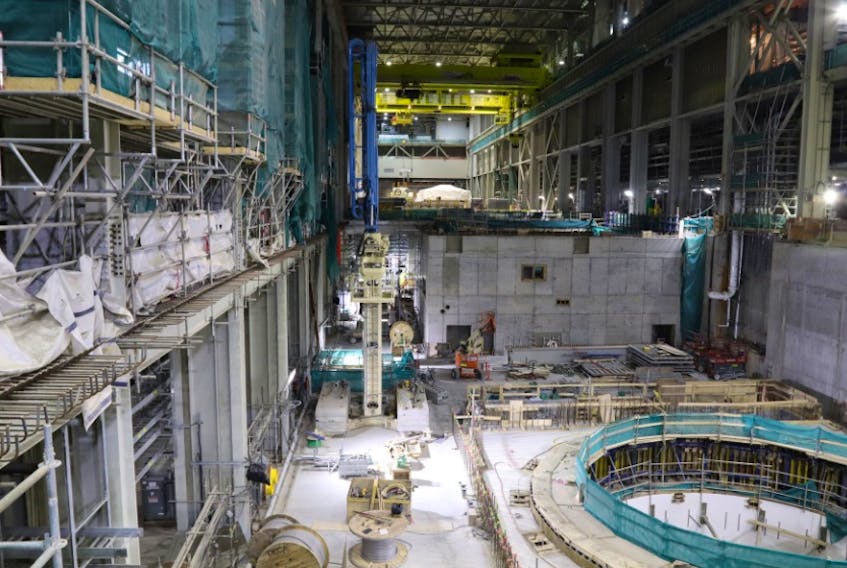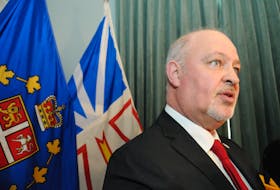The Government of Newfoundland and Labrador didn’t put a price to the public on what it might actually cost to cancel the Muskrat Falls hydroelectric project. The Progressive Conservative government didn’t, when the costs started to increase. The Liberals didn’t either, when they came to power in 2015 and costs were continuing to go up.
Shutting down the project was considered too expensive, although Nalcor Energy has confirmed a detailed analysis was never completed.
A new study from the C.D. Howe Institute offers a dollar figure now on scrapping the works.
“For our part, we have calculated cancellation costs for Muskrat (Falls) at $1.47 billion, based on the estimated average cancellation cost per kilowatt of Site C and Keeyask,” states the C.D. Howe Institute report, referring to the 1,132-megawatt (MW) Site C hydroelectric project on the Peace River in British Columbia and the 695-MW Keeyask hydro power project in Manitoba on the Nelson River.
The $1.47-billion estimated cancellation cost for Muskrat Falls would come atop the $8.9 billion spent — as per the last project update, covering spending to the end of November 2018.
For added context, in April 2016 a provincial access to information request revealed a government briefing note warning of “substantive legal and financial implications for the province” if construction were to be stopped, with default under the project federal loan guarantee and financing arrangements, loss of the assets, risk to firm energy supply, with the added “high likelihood” of downgrading by credit rating agencies. The note had redactions, but again, no dollar figure for shutting down the project.
“Dammed if you do: How sunk costs are dragging Canadian electricity ratepayers underwater” was released Thursday and is available online. It looks at each of the three, aforementioned hydro projects to ask if it makes financial sense to finish construction, versus scrapping the projects and going for an alternative (using combined cycle gas turbines).
In British Columbia and Manitoba, the gas turbine option is attractive. The analysis suggested that wasn’t the case for Newfoundland and Labrador.
“I always want to make sure I caveat things appropriately. (But) based on the analysis we ran, and based on just the additional spend that was announced, we do believe that based on that analysis the best course of action would be to continue (Muskrat Falls construction),” the study’s lead author, A. J. Goulding, president of London Economics International, told The Telegram.
Goulding said there were scenarios where that conclusion could change, including further increases in the estimated cost, currently at $12.7 billion, including interest and financing costs.
For now, the probabilistic analysis suggests finishing the power facility on the Churchill River — getting it up and running, feeding the new transmission lines that are part of the project’s total cost and meeting commitments in Nova Scotia — is the best option from a purely economic perspective.
Apart from the look at an alternative, the report does include advice to provincial and federal governments toward more careful, transparent and independent consideration of megaprojects in the future. It recommends ensuring independent regulatory review delving into the economics of power projects. For Newfoundland and Labrador, that’s generally considered full review at the Public Utilities Board (PUB).
While there may be verbal commitments by some politicians today for full review of projects by a regulator, Goulding recommends to the extent possible pushing that into legislation and making it more difficult to avoid review. Memories fade, he noted, and the opportunity to cut a big, red ribbon will remain a political lure.
“I think that the challenge is that governments always think that it’s a benefit, that they can get things done quicker without running it through a transparent regulatory process, but those processes ultimately bring forth additional issues that end up making the project more robust if it goes ahead,” he said.
Another recommendation was tied to consideration of benefits of private sector involvement, as opposed to projects remaining solely with Crown corporations. A regulator’s rulings or cost overruns have direct consequence to shareholders of private interests. When money is lost, Goulding suggests, they are likely to immediately press boards of directors for action.
“Crown corporations losing money (or not making as much as they should) may be tolerated for a much longer period of time,” the report states.
The C.D. Howe release also highlights changes in the North American energy markets reducing demand, as well as the flexibility that comes with smaller, incremental projects compared to a megaproject investment.
“Having the option to build something smaller and later means that provincial utilities can better tailor future investments to updated power sector dynamics, while being able to take advantage of intervening technological changes. Furthermore, the ability to spread these investments across the grid may enhance reliability and resiliency,” it stated.
As of the end of December, according to Nalcor Energy, construction of the Muskrat Falls hydroelectric megaproject was 96 per cent complete.
RELATED ARTICLES:
LETTER: Cancelling Muskrat Falls wasn’t a viable option
BRIAN JONES: Smart to cancel billion-dollar boondoggles









